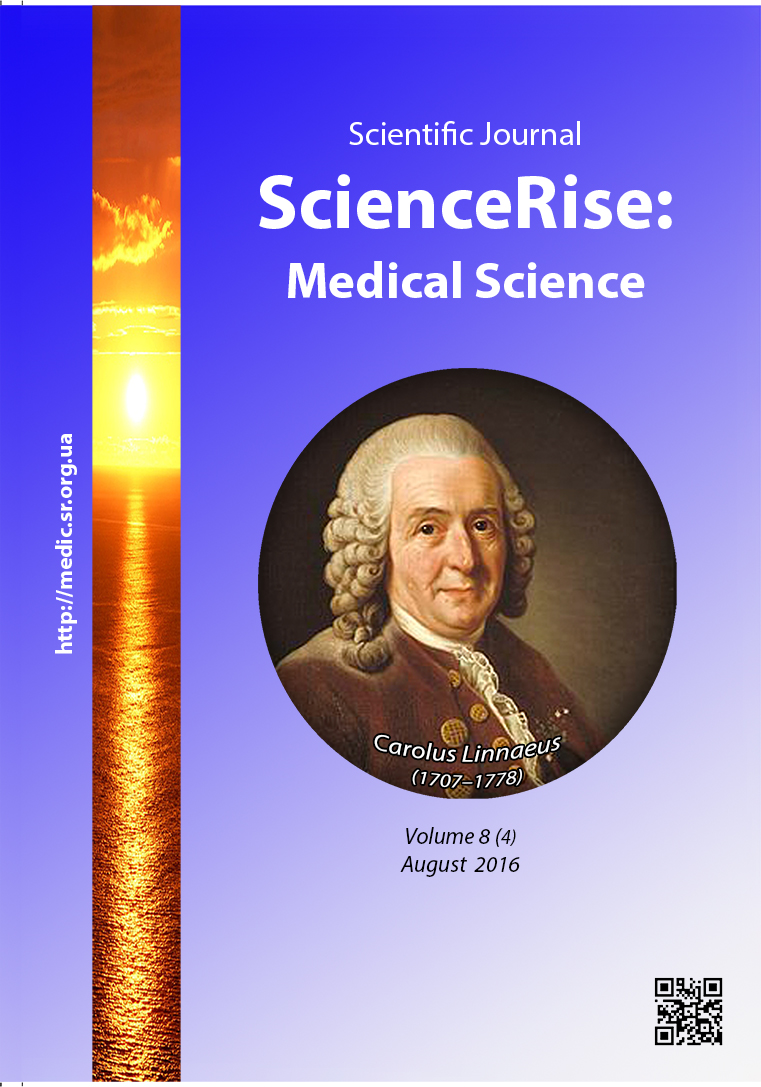Study of features of coping-behavior in patients with acne
DOI:
https://doi.org/10.15587/2519-4798.2016.76566Keywords:
coping, acne, patients, dermatology, psychodermatology, medical-psychological help, psychological targetsAbstract
Acne is an urgent problem of the modern dermatology and psychodermatology. It most patients near 20 years acne regresses, but in 10 – 20 % of them dermatosis becomes chronic.
Aim of research – to study the features of coping-behavior of patients with acne.
Materials and methods. 142 patients with chronic acne took part in the research – the main group (MG): 75 patients of female and 67 ones of male sex, and 70 interrogated without dermal or any other chronic somatic pathology – the group of comparison (GC), 35 girls and 35 boys respectively. The questionnaire by R. Lazarus “The ways of overcoming behavior” was used as a diagnostic instrument.
Results of research. In the research was revealed that coping of patients with acne is characterized with expressed directionality on the search for social support, overcoming of the negative feelings at the expense of subjective lowering of significance and emotional involvement as to the stress event, reaction by escaping type. Patients with acne are inclined to use the conventionally adaptive and non-adaptive coping forms. The types of anti-stress activity in men and women differ.
Conclusions. The established features indicate the necessity to take into account the features of behavior patterns at elaboration of model of medical-psychological help for patients with acne and differentiation of psychological influences depending on type of stress-overcoming behavior
References
- Keri, J. (2016). What’s new in acne and rosacea? Seminars in Cutaneous Medicine and Surgery, 35 (2), 103–106. doi: 10.12788/j.sder.2016.030
- Shupenko, A. N., Stepanenko, V. I. (2009). Acne in men: State of the art and the relevance of the definition set of additional factors and mechanisms that are important in the pathogenesis of dermatosis. Cosmetology, 4 (35), 46–61.
- Collier, C. N., Harper, J. C., Cantrell, W. C., Wang, W., Foster, K. W., Elewski, B. E. (2008). The prevalence of acne in adults 20 years and older. Journal of the American Academy of Dermatology, 58 (1), 56–59. doi: 10.1016/j.jaad.2007.06.045
- Dorozhenok, I. Y., Matiushenko, E. N. (2009). Nozogenic mental disorders in patients with acne. Mental disorders in general medicine, 2, 33–38.
- Rayeva, T. V. (2006). Cognitive mechanisms of coping with acne. Bulletin of Tyumen State University, 1, 247–254.
- Matiushenko, E. N. (2011). Dysmorphophobia in dermatological practice. Mental disorders in general medicine, 3-4, 11–17.
- Naumova, L. O. (2014). Hormonal disorders asanimp or tantpatho genetic factor of acne in women. International Journal of Endocrinology, 5 (61). Available at: http://www.mif-ua.com/archive/article/39145#prettyPhoto
- Kogan, B. G., Verba, E. A. (2012). New approaches in the combined treatment of acne: a look at the problem from the point of view of practical public health. Ukrainian Journal of Dermatology, Venereology, cosmetology, 3 (46), 72–76.
- Monakhov, S. A., Bogadelnikova, A. E. (2013). An innovative solution to external treatment of acne. Clinical Dermatology and Venereology, 2, 36–40.
- Koo, J., Lee, C. (2003). Psychocutaneous Medicine. NY, 376.
- Potekaev, N. N., Goryachkina, M. V., Savenkov, V. V. et. al. (2009). Psychosomatic aspects of acne in women. Dermatology, 3, 7–11.
- Kryukova, T. L., Kuftyak, E. V. (2007). Ways of coping questionnaire (WCQ adaptation techniques). Journal of Practical Psychology, 3, 93–112.
Downloads
Published
How to Cite
Issue
Section
License
Copyright (c) 2016 Максим Валерійович Литвиненко

This work is licensed under a Creative Commons Attribution 4.0 International License.
Our journal abides by the Creative Commons CC BY copyright rights and permissions for open access journals.
Authors, who are published in this journal, agree to the following conditions:
1. The authors reserve the right to authorship of the work and pass the first publication right of this work to the journal under the terms of a Creative Commons CC BY, which allows others to freely distribute the published research with the obligatory reference to the authors of the original work and the first publication of the work in this journal.
2. The authors have the right to conclude separate supplement agreements that relate to non-exclusive work distribution in the form in which it has been published by the journal (for example, to upload the work to the online storage of the journal or publish it as part of a monograph), provided that the reference to the first publication of the work in this journal is included.









